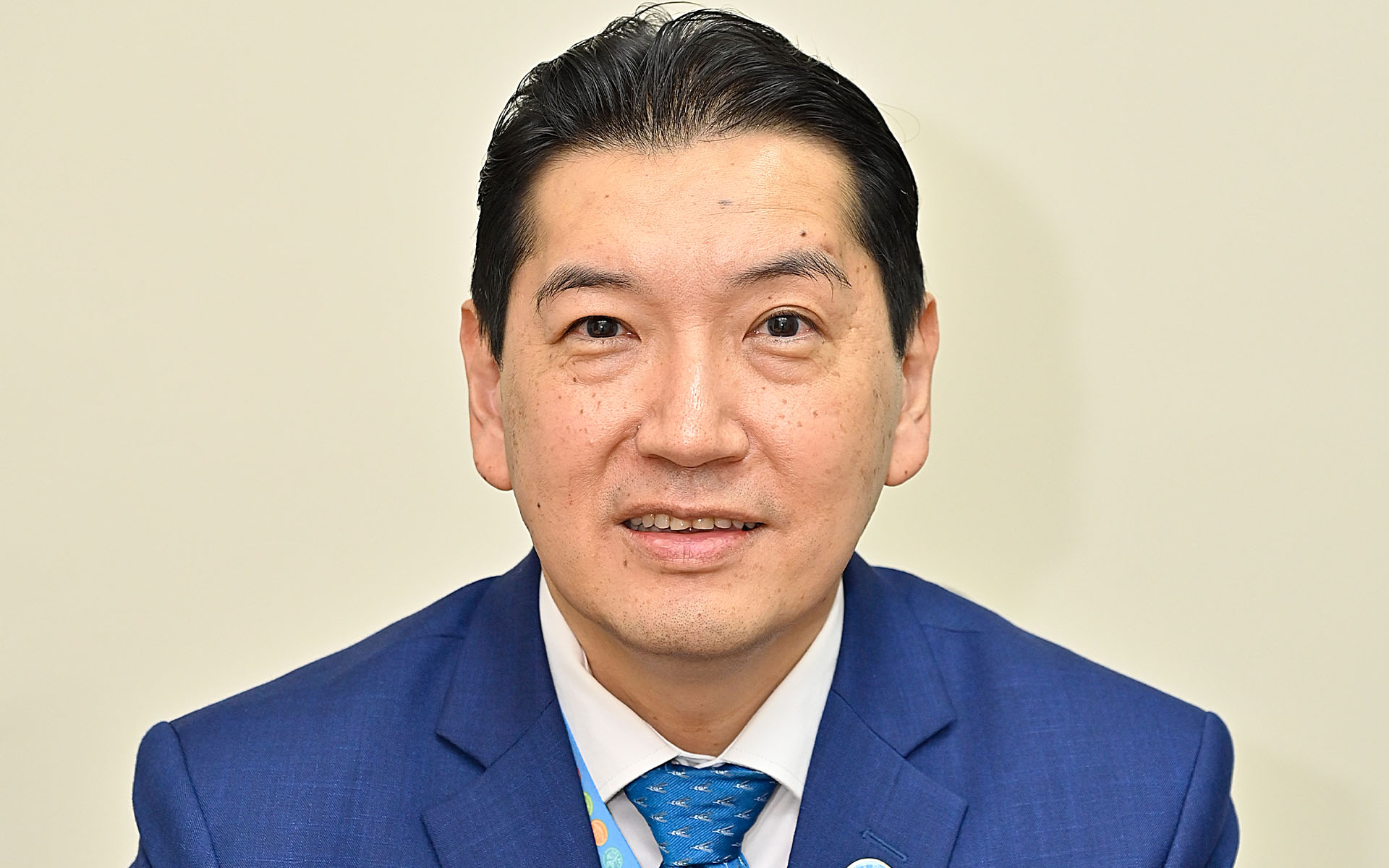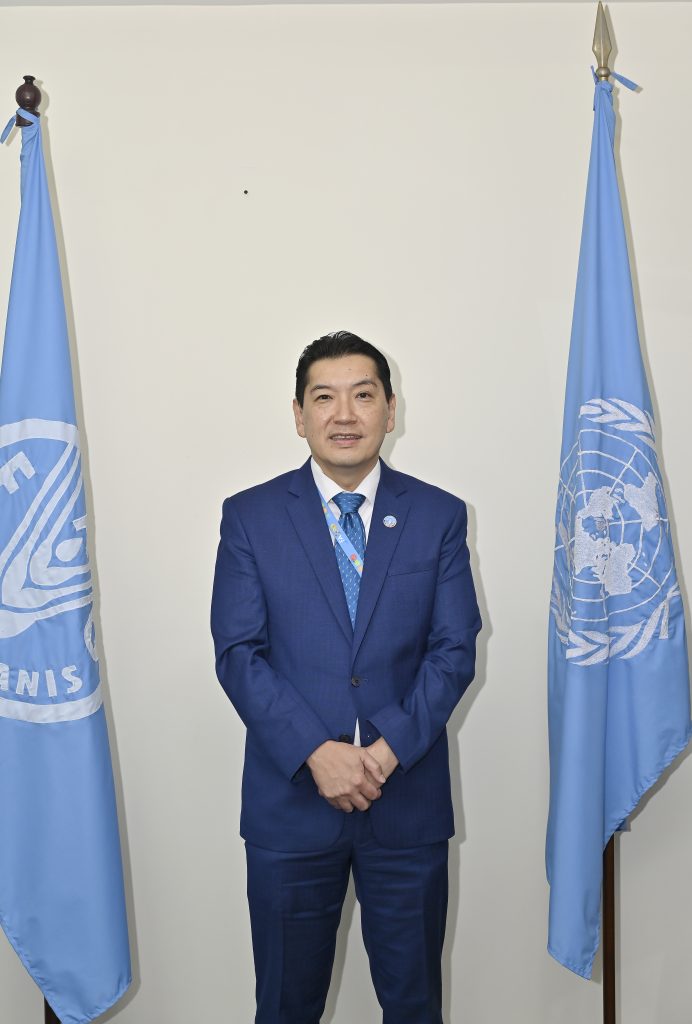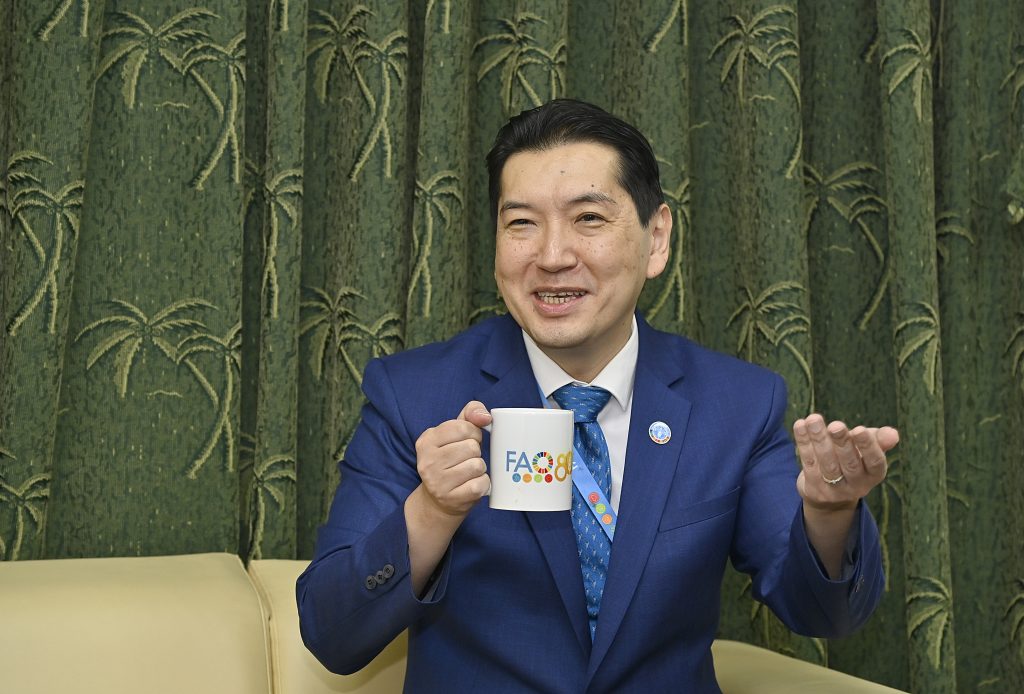

 20.14°C काठमाडौं
20.14°C काठमाडौं

When Ken Shimizu took office as the Food and Agriculture Organization of the United Nations (FAO) Country Representative for Nepal in July 2021, he carried with him nearly three decades of international experience in agri-food system transformation spanning a broad range of technical areas, including food security, agriculture, climate action, natural resources management, disaster risk reduction and emergency response.
His journey has taken him from the Caribbean to Timor Leste, Indonesia, Vietnam, Papua New Guinea, Bhutan, and in Nepal, with each assignment involving projects related to building resilience, solidarity, and contributing to sustainable development.
Ken is an extraordinary development professional. His work and philosophy embody a vision that sees transformative impacts in agriculture, climate resilience, food security, and disaster management, based on a collaborative approach among government, civil society, private sector, development partners, and academia.
For him, leading FAO’s mission in Nepal is not only about supporting formulation of policy frameworks and providing technical expertise but redefining agri food systems through innovation, investment and collaborative partnerships by connecting people, and empowering communities for a better environment, livelihoods and future.
Reflecting on his 27 years career, Ken emphasizes that his ability to manage seemingly diverse fields of expertise stems from seeing their interconnectedness. “Food security cannot be achieved without climate resilience. Agriculture cannot thrive without sustainable land and water management. And disaster preparedness is a safeguard for sustained agricultural productivity,” he explains. This system’s approach and thinking has shaped his leadership across multiple countries.
Whether in Papua New Guinea’s rural villages, the Caribbean’s climate-vulnerable coasts, or the Himalayan foothills of Nepal, he has consistently pursued integrated solutions rooted in local contexts but guided by global best practices, technologies and innovation. He credits much of his effectiveness to partnerships with governments, UN agencies, the private sector, and, most importantly, agri-entrepreneurs, farmers and local communities. “Resilient and sustainable solutions are only possible when people themselves are co-creators,” he says.
Ken’s secret to managing time and energy is not efficiency hacks or rigid schedules, but passion. “It’s simple, my job is my passion, and passion is at the core of everything I do ,” he says. Whether uplifting Nepal’s youth to adopt modern farming, or co-developing climate solutions with governments, Shimizu devotes himself to projects aimed at driving real transformation at the community and ground level. What keeps him energized is his dynamic and diverse team of professionals from different ages, backgrounds, and nationalities.
“I am truly content when I can empower the next generation of leaders who will carve out the future for agri-food systems,” he reflects.

Each country Ken has served in has shaped his philosophy. In Papua New Guinea, where he spent nearly eight years, he encountered deep cultural diversity with over 800 languages spoken and communities profoundly connected to traditional knowledge. Despite economic and social divides, conflicts and security issues, insufficient infrastructure and vulnerability to natural disasters, their resilience was remarkable. “There, I learned that resilience is a way of life, and I myself became more resilient, considering that I started the office just by myself and expanded it into an office leading one of the largest United Nations Joint Programme in the Pacific” he recalls.
In the Caribbean, climate change was a harsh reality. Rising sea levels and frequent climactic events tested communities, but their collective solidarity and ability to rebuild after disasters left him inspired. In Indonesia and Vietnam, he also witnessed the resilience of people recovering from natural disasters and other emergencies. “These experiences always reminded me that development must build upon local knowledge systems, ownership, and sustainability,” he says.
And in Nepal, Ken found both professional inspiration and personal warmth. “This country has been nothing short of extraordinary. It’s a kaleidoscope of pleasant discoveries,” he says. Nepal’s landscapes ranging from plains, hills, and the Himalayan mountains are breathtaking, while the culture, knowledge and tradition of its people are rich and diverse, but it is the kindness and the generosity of the Nepali people that has touched him the most.
“The hospitality here wraps you up like a cozy pashmina of the mountains and reminds you what human connection truly means.” He is also impressed by the respect and harmony towards diverse cultures, languages, and religions. “Nepal is a beautiful and unique mosaic of culture, heritage, religion and people.”
Professionally, he is impressed by Nepal’s balance between tradition and innovation. “Nepal is moving forward with digital agriculture, innovation, youth involvement, and climate-resilient farming, while still respecting its traditional knowledge and systems.

Under Ken’s leadership, FAO Nepal is expanding and diversifying its portfolio, and is successfully implementing many of FAO’s global initiatives; Hand in Hand Initiative, One Country One Priority Product, Digital Village Initiative, Green Cities and One Health approach, in close collaboration with the Government of Nepal, civil society, private sector, development partners and academia, including farmers groups, agri-entrepreneurs, youth organizations, indigenous and vulnerable communities, and women’s associations.
FAO’s projects and initiatives are intended to strengthen the value chain for agricultural commodities, promote digital agricultural innovation, tools, and technologies, and catalyze investments towards agri-foods systems transformation in Nepal.
Additionally, FAO is supporting the establishment of Geographical Indications (GI), Geographical Indications Environment Sustainability (GIES) and Globally Important Agricultural Heritage Systems (GIAHS) to recognize and promote Nepal’s brand and products within the global arena, while protecting its unique cultural heritage and ensuring environmental sustainability.
FAO Nepal is also promoting a holistic, integrated approach to agri-food systems transformation, by converging various projects and initiatives to strengthen capacities at the village level, under the Four Better Model Villages Initiative, in line with FAO’s guiding principles, the Four Betters: Better Production, Better Nutrition, Better Environment and Better Life, Leaving no one behind.
For Ken, multilateralism is a means of survival in today’s world of interconnected crises. “As we grapple with the impacts of the triple planetary crisis; climate change, pollution, and biodiversity loss, we are also faced with rapid globalization, urbanization and global population growth. No nation can act alone. Solutions must come from collective action, shared values, and inclusive dialogue,” he argues. He points to Nepal’s role as a strong leader on the global stage, advocating for climate justice and finance, strengthened collaboration and partnerships for inclusive, responsible and sustainable development, as the country plans to graduate from LDC status in 2026. Ken acknowledges that multilateralism is not automatic. “It requires patience, trust, and openness to diverse perspectives,” he says. “Yet, when countries unite, the ripple effect of collaboration extends far beyond borders.”
Although Japan will always be his home, Ken has spent most of his professional life abroad. What has kept him away for so long? He has embraced every colleague as a family member and strongly believes that solidarity and unity across borders and countries is indispensable for a better future. Each assignment has been more than a job, it has been an education in humility, adaptation, and cultural understanding.
Living abroad, however, comes with sacrifices: missing family milestones and the comfort of home. Yet for Ken, the reward lies in the connections he has built and the knowledge that, despite cultural differences, people everywhere share universal aspirations for resilience, dignity and a better future. He added, “I’ve adopted each country as a second home. They have challenged my assumptions, shaped my values, and strengthened my belief in international cooperation and exchange.
Looking back at his tenure in Nepal so far, Ken describes it as both humbling and energizing. From sipping tea in mountain villages, interacting with remote communities and youths, feeling the diverse culture and heritages to strategizing with government officials, he has found inspiration at every level. Nepal’s youth and private sector, he believes, are emerging as powerful drivers of agricultural innovation and transformation. Combined with traditional knowledge and global cooperation, they hold the key to building a food system that is inclusive, resilient and sustainable.
As he continues his mission, Ken remains guided by values instilled in him during his upbringing in Japan where community values such as diligence, persistence and discipline are the foundation of success. “Those values of balance, sustainability, and community harmony still guide me today,” he says softly.
Ken’s story is one of dedication to building resilient food systems and communities across continents. His journey from Japan to the Pacific Islands, the Caribbean, Southeast Asia and now the Himalayas reflects a belief that our global challenges are shared and so must be our solutions. Whether working in a disaster-stricken village or at a high-level policy forum, he brings the same conviction: that people, when empowered and united, can be strong catalysts and drivers for a better future. In Nepal, as in every country he has served, Ken is creating milestones for a better today and tomorrow. He is planting seeds of resilience, innovation, and hope that will bear fruit for generations to come.